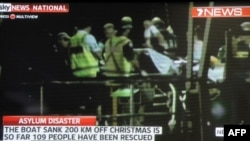SYDNEY - Dozens of asylum seekers are feared drowned after their boat capsized in rough seas north of Australia. More than 100 people have been rescued as authorities from Australia and Indonesia frantically search for the missing. At least three bodies have been recovered.
The first group of asylum seekers has arrived on Christmas Island, a remote Australian territory in the Indian Ocean, but there is still no sign of about 90 others still missing after their boat capsized 200 kilometers north-west of the island late Thursday.
Mal Larsen, a spokesman for the Australian Maritime Rescue Authority, says rescuers have not stopped searching for those still in the water.
“The search actually continued overnight but obviously it went first light commenced this morning it picked up in pace because it is much easier to search for people in daylight," he said. "And a number of aircraft and vessels have been tasked and are on the scene and are assisting authorities attempting to find survivors.”
Four Indonesian and Australian warships, four merchant ships and five Australian government aircraft are scouring waters halfway between Java in Indonesia and Christmas Island, a favored destination for trafficking gangs.
Australian Home Affairs and Justice Minister Jason Clare hopes that more survivors can be found.
“The water temperature is about 29 degrees. The sea state is sea state three, so at sea state three there is the prospect that there are people out there still alive. And over the course of 36 hours from the time the boat capsized, my advice is that people can survive out there if they've got either life jackets or they are able to hold onto debris as a lot of people did through the course of yesterday,” exlained Clare.
It is not yet clear where the boat passengers were from, but most asylum seekers trying to reach Australia are escaping violence and poverty in Afghanistan, Iraq, Iran or Sri Lanka.
So far this year about 57 boats carrying more than 4,000 people have been intercepted in Australian waters. The steady flow of unauthorized arrivals has become a divisive political issue. Australia’s conservative opposition has accused the Labor government of losing control of the nation’s borders. Prime Minister Julia Gillard has unsuccessfully tried to set up offshore refugee camps in neighboring countries in an attempt to deter asylum seekers.
In December 2010, at least 50 people died when an asylum seeker boat broke up against Christmas Island's rocky coast.
Canberra grants protection visas to about 13,000 refugees through various international humanitarian schemes each year.
The first group of asylum seekers has arrived on Christmas Island, a remote Australian territory in the Indian Ocean, but there is still no sign of about 90 others still missing after their boat capsized 200 kilometers north-west of the island late Thursday.
Mal Larsen, a spokesman for the Australian Maritime Rescue Authority, says rescuers have not stopped searching for those still in the water.
“The search actually continued overnight but obviously it went first light commenced this morning it picked up in pace because it is much easier to search for people in daylight," he said. "And a number of aircraft and vessels have been tasked and are on the scene and are assisting authorities attempting to find survivors.”
Four Indonesian and Australian warships, four merchant ships and five Australian government aircraft are scouring waters halfway between Java in Indonesia and Christmas Island, a favored destination for trafficking gangs.
Australian Home Affairs and Justice Minister Jason Clare hopes that more survivors can be found.
“The water temperature is about 29 degrees. The sea state is sea state three, so at sea state three there is the prospect that there are people out there still alive. And over the course of 36 hours from the time the boat capsized, my advice is that people can survive out there if they've got either life jackets or they are able to hold onto debris as a lot of people did through the course of yesterday,” exlained Clare.
It is not yet clear where the boat passengers were from, but most asylum seekers trying to reach Australia are escaping violence and poverty in Afghanistan, Iraq, Iran or Sri Lanka.
So far this year about 57 boats carrying more than 4,000 people have been intercepted in Australian waters. The steady flow of unauthorized arrivals has become a divisive political issue. Australia’s conservative opposition has accused the Labor government of losing control of the nation’s borders. Prime Minister Julia Gillard has unsuccessfully tried to set up offshore refugee camps in neighboring countries in an attempt to deter asylum seekers.
In December 2010, at least 50 people died when an asylum seeker boat broke up against Christmas Island's rocky coast.
Canberra grants protection visas to about 13,000 refugees through various international humanitarian schemes each year.







